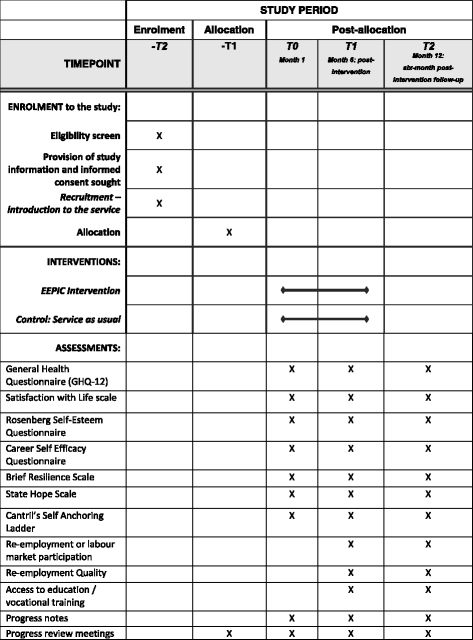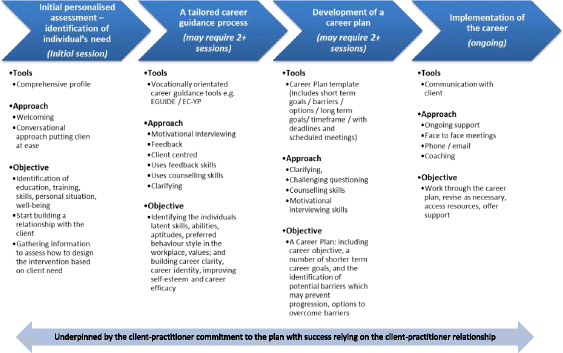EEPIC - Enhancing Employability through Positive Interventions for improving Career potential: the impact of a high support career guidance intervention on the wellbeing, hopefulness, self-efficacy and employability of the long-term unemployed - a study protocol for a randomised controlled trial
- PMID: 29482648
- PMCID: PMC5828489
- DOI: 10.1186/s13063-018-2485-y
EEPIC - Enhancing Employability through Positive Interventions for improving Career potential: the impact of a high support career guidance intervention on the wellbeing, hopefulness, self-efficacy and employability of the long-term unemployed - a study protocol for a randomised controlled trial
Abstract
Background: Labour market policy (LMP) and its implementation have undergone rapid change internationally in the last three decades with a continued trend towards active LMP. In Ireland however, this shift has been more recent with ongoing reforms since 2012 and a concomitant move toward active labour market 'work-first' policy design (i.e. whereby unemployed people are compulsorily required to work in return for their social welfare benefits). Labour market policies vary from those that require this compulsory approach to those which enable the unemployed to move towards sustainable quality work in the labour market through upskilling (human capital approach). Despite this, however, long-term unemployment-a major cause of poverty and social exclusion-remains high, while current employment support approaches aimed at sustainable re-employment are, arguably, unevaluated and under examined. This study examines the effectiveness of a new high support career guidance intervention in terms of its impact on aspects of wellbeing, perceived employability and enhancing career sustainability.
Method: The study involves a single-centre randomised, controlled, partially blinded trial. A total of 140 long-term unemployed job-seekers from a disadvantaged urban area will be randomly assigned to two groups: (1) an intervention group; and (2) a 'service as usual' group. Each group will be followed up immediately post intervention and six months later. The primary outcome is wellbeing at post intervention and at six-month follow-up. The secondary outcome is perceived employability, which includes a number of different facets including self-esteem, hopefulness, resilience and career self-efficacy.
Discussion: The study aims to assess the changes in, for example, psychological wellbeing, career efficacy and hopefulness, that occur as a result of participation in a high support intervention vs routinely available support. The results will help to inform policy and practice by indicating whether a therapeutic approach to job-seeking support is more effective for long-term unemployed job-seekers than routinely available (and less therapeutic) support. The findings will also be important in understanding what works and for whom with regard to potentially undoing the negative psychological impacts of unemployment, building psychological capital and employability within the individual, and developing career trajectories leading to more sustainable employment.
Trial registration: ISRCTN registry, ISRCTN16801028 . Registered on 9 February 2016.
Keywords: Employability; High support career guidance; Labour market activation; Long-term unemployed; Positive psychological interventions; Wellbeing.
Conflict of interest statement
Ethics approval and consent to participate
The study was approved by National University of Ireland Maynooth Social Research Ethics Committee on 05/06/2014 (no. SRESC-2014-028) and is registered by the ISRCTN registry (ISRCTN16801028).
Consent for publication
Consent is sought from participants involved in this study at the first meeting with the researcher. Participants are provided with an information sheet (see Additional file 3) which outlines the background to the study, the rationale, the objectives and details regarding the publication of the study. Participants also receive a consent form (see Additional file 3) which they are asked to sign; a copy is given to them to retain for their own records.
Competing interests
The authors declare that they have no competing interests.
Publisher’s Note
Springer Nature remains neutral with regard to jurisdictional claims in published maps and institutional affiliations.
Figures
Similar articles
-
Facing unemployment: study protocol for the implementation and evaluation of a community-based intervention for psychological well-being promotion.BMC Psychiatry. 2017 Jul 19;17(1):261. doi: 10.1186/s12888-017-1416-x. BMC Psychiatry. 2017. PMID: 28724370 Free PMC article.
-
Effectiveness of a three-component intervention supporting unemployed individuals with mental health issues in their job search and mental health recovery (3for1): study protocol of a non-randomized controlled study.BMC Public Health. 2024 Nov 14;24(1):3159. doi: 10.1186/s12889-024-20323-0. BMC Public Health. 2024. PMID: 39543550 Free PMC article.
-
Efficacy of a Mobile App-Based Behavioral Intervention (DRIVEN) to Help Individuals With Unemployment-Related Emotional Distress Return to Work: Protocol for a Randomized Controlled Trial.JMIR Res Protoc. 2024 Nov 26;13:e62715. doi: 10.2196/62715. JMIR Res Protoc. 2024. PMID: 39589786 Free PMC article.
-
[What support of young presenting a first psychotic episode, when schooling is being challenged?].Encephale. 2017 Dec;43(6):570-576. doi: 10.1016/j.encep.2017.10.001. Epub 2017 Nov 8. Encephale. 2017. PMID: 29128195 Review. French.
-
[A group cognitive behavioral intervention for people registered in supported employment programs: CBT-SE].Encephale. 2014 Jun;40 Suppl 2:S81-90. doi: 10.1016/j.encep.2014.04.005. Epub 2014 Jun 16. Encephale. 2014. PMID: 24948482 Review. French.
Cited by
-
Employability resources of unemployed adults: longitudinal effects of a group career intervention.Front Psychol. 2025 Jan 28;16:1470611. doi: 10.3389/fpsyg.2025.1470611. eCollection 2025. Front Psychol. 2025. PMID: 39936012 Free PMC article.
-
Health-improving interventions for obtaining employment in unemployed job seekers.Cochrane Database Syst Rev. 2020 Jan 8;1(1):CD013152. doi: 10.1002/14651858.CD013152.pub2. Cochrane Database Syst Rev. 2020. PMID: 31912888 Free PMC article.
-
Maintaining High Eudaimonic Wellbeing Despite Ambiguity Intolerance Among Three Employment Status Groups: Examining the Buffering Effects of Positive Psychological Attributes.Int J Appl Posit Psychol. 2022;7(1):1-30. doi: 10.1007/s41042-021-00051-1. Epub 2021 Mar 30. Int J Appl Posit Psychol. 2022. PMID: 33816777 Free PMC article.
References
-
- Manroop L, Richardson J. Job search: a multidisciplinary review and research agenda. Int J Manag Rev. 2015;18:206–227. doi: 10.1111/ijmr.12066. - DOI
-
- ILO. World Employment Social Outlook: Trends 2016. http://www.ilo.org/global/research/global-reports/weso/2016/WCMS_443480/....
-
- Martin JP. Activation and active labour market policies in OECD countries: stylized facts and evidence on their effectiveness. IZA Policy Paper No.84. June, 2014.
-
- Bredgaard T. Evaluating what works for whom in active labour market policies. Eur J Soc Secur. 2015;17(4):436–452. doi: 10.1177/138826271501700403. - DOI
-
- Baruffini M. An agent-based simulation of the Swiss labour market: an alternative for the labour market policy evaluation. 53rd Congress of the European Regional Science Association: Regional Integration: Europe, the Mediterranean and the World Economy. Palermo, Italy. 2013;27–31.
Publication types
MeSH terms
LinkOut - more resources
Full Text Sources
Other Literature Sources



